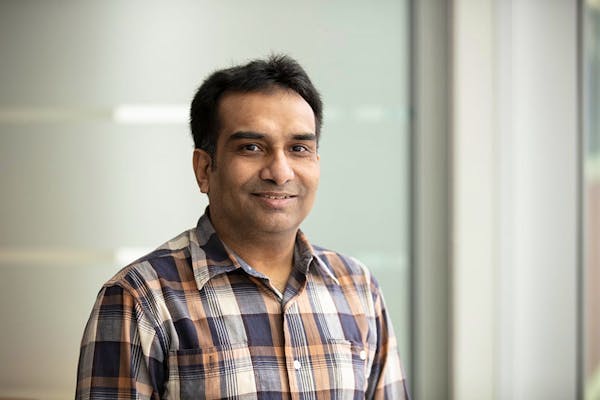Guest Essay: Lived Experience as a Muslim in the United States
By Syed Mahmud, RN
Thursday, April 28, 2022
The following is a guest essay from student diversity officer and soon to be SON alum, Syed Mahmud, who is completing the Family Psychiatric Mental Health Nurse Practitioner Program this May. Originally from Bangladesh, Syed arrived to the School of Nursing from Ohio, and has made Rochester his home with his family. After graduation he hopes to practice as a Psych NP.

Asssalamualaikum (Peace be upon you).
The only time I feel isolated as a Muslim in the States is during Ramadan and Eid (biggest celebration of Muslims). This is because to feel the flavor of those celebrations, one needs a Muslim community and environment.
I am writing this at the beginning of Ramadan Eve. For those who are not familiar with Ramadan, this is a month-long fasting program for Muslims. This is the first evening of Ramadan, when we are supposed to check if the moon of the lunar month or Ramadan is there in the sky. However, when the weather is cloudy and cold this is very difficult. Fortunately, we have technology that can identify if other parts of the world such as Saudi Arabia, home to Mecca, have sighted the moon. This is important because it starts the month of Ramadan, otherwise it would begin the following day.
I remember that as soon as the moon was sighted the national TV of Bangladesh broadcasted the song of Ramadan. This is an excitement that my son will never know. Instead, he is laughing at his computer watching something funny (I don’t blame him).
As Muslims, we are supposed to pray five times a day and he prays with me most of the time. But he does not hear the adhan, the Islamic call to prayer before each prayer announced from all mosques, as it is not allowed here.
I am from Dhaka, the city of mosque, where you wake up with the acoustic recitation of adhan every day. At the time of prayer there are so many adhans floating in the air from each angle that it is difficult to deny that call.
However, I am glad that we have at least one mosque in every city where we can go and pray. Also, I can proudly declare that I have never faced any difficulties to perform my prayer from my job or school. In my last job, at a nursing home, my manager ordered a special respirator instead of N95 as I have a beard for religious reasons. I feel this action demonstrates the beauty and modesty of this country.
Muslims have two big festivals in a given year called Eid.
The first one, Eid-Ul-Fitr, is celebrated at the end of Ramadan. After a long fasting month, it is a great source of joy. There are feasts hosted in Muslim homes throughout the day; unfortunately, this is not a public holiday, like Christmas. I think this is important because we need community to celebrate Eid-Ul-Fitr. While Muslims have options to take off on this day from school and work, from a broader perspective community consists of Muslim and non-Muslim people, many of whom are our classmates, colleagues, friends, or neighbors. During Christmas we all celebrate, regardless of our religion. However, during Eids we can hardly do that because our community is busy since schools and offices are open. We cannot invite our non-Muslim friends even if we want to.
The same thing happens in our other Eid, Eid-Ul-Adha. I believe at least one day of a year for each religion should be considered a public holiday so that these diverse celebrations can be practiced appropriately.
I believe we can practice our religion personally and that it is independent of where we are. I feel we have enough facilities to practice Islam here. It depends on the person. There are options of Halal food at many places. My wife practices hijab and she works in the community; nobody bothers her, and some even appreciate her. Although a religious atmosphere helps, the peace in Allah can be felt at any place on earth.
Syed Mahmud, RN
Student Diversity Officer
Student, Family Psychiatric Mental Health Nurse Practitioner Program
Categories: RN to BS Online Program

